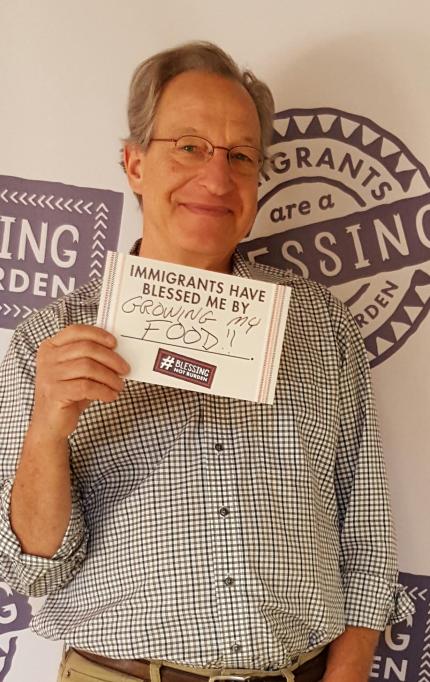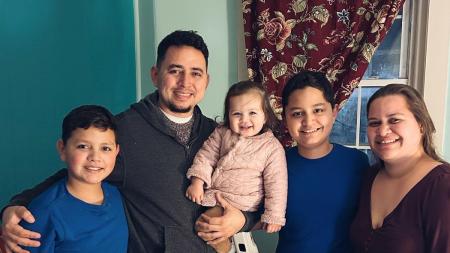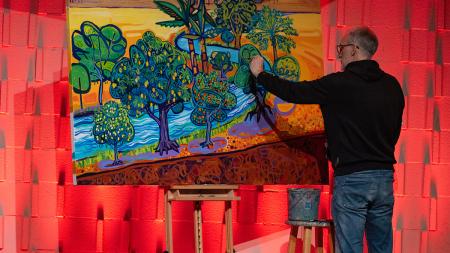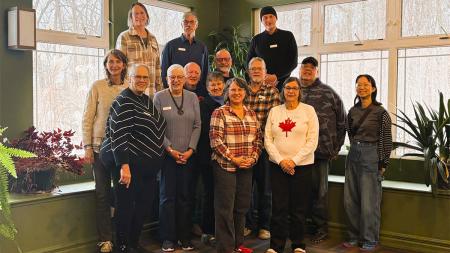Vander Meulen Retires as Coordinator of Office of Social Justice

Peter Vander Meulen has been a strong advocate for immigrant rights.
After serving and helping to shape the structure and mission of the Christian Reformed Church for nearly 45 years, Peter Vander Meulen is retiring.
Considered a leader in the wider evangelical movement for social justice and ecumenical relations, Vander Meulen has played a role in helping to bring resolution to the war in Sierra Leone, which was fueled by rebels using weapons purchased through the sale of “blood diamonds" mined in Africa and illegally sold for arms.
Vander Meulen also helped several years ago to broker a peace between warring factions in Nigeria, and he has recently played a role in facilitating peace talks between different groups in that country.
“I’ve had a chance, as a representative of the CRC, to stand with people who generally are not heard and to help bring about some level of shalom,” he said.
“I’ve realized that our faith and our voice can influence the world and that at the same time we’ve let the world influence us and bring us more closely together. . . . I’ve lived and worked with an incredibly wide variety of people all over the world.”
Along the way, he said, “I’ve been given a view of God and God’s community that is very rich.”
In the process, Vander Meulen has been a powerful advocate for justice in the CRCNA and beyond, said Peter Borgdorff, executive director emeritus of the denomination who worked closely with Vander Meulen for many years.
“I’ve talked with others who say Peter is highly respected when it comes to speaking for the church, not just the CRC, but in Washington, D.C., and elsewhere. His influence has been substantial,” said Borgdorff.
Vander Meulen grew up in Grandville, Mich. After graduating from Calvin College in 1973 with a degree in philosophy, he decided to see the world as a volunteer before settling into “real life.”
He considered joining the Peace Corps but instead decided on volunteering with the newly formed Christian Reformed World Relief Committee, now World Renew.
World Renew had only a few employees at the time, and Peter made clear to his boss that he wanted to work outside the office. He didn’t want to have a desk job but wanted to be “out there in the jungles. I wanted to live in a hut.”
Soon he was put in charge of CRWRC’s Disaster Volunteer Services. His first assignment was to lead volunteers to assist residents of Xenia, Ohio, in the aftermath of a tornado.
He followed that up by spending several months in Nicaragua, documenting the work done by other CRWRC staff and volunteers following the devastating Managua earthquake.
He left Nicaragua to be part of the emergency response to Hurricane Fifi in San Pedro Sula, Honduras.
“I remember during that period how we would make coalitions with other groups to find truckloads of cement and to build houses. I loved the work. Pretty much we were the new kids on the block.”
The ongoing needs in Nicaragua, as well as a young woman and nurse named Peggy, however, beckoned him to return to Managua.
“Before I had left there, I interviewed her for a long time for a story I was doing for CRWRC,” he said. “She once asked others I interviewed if I had taken so much time with them, but they told her ‘no.’”
Peter and Peggy were eventually married.
In 1976, he moved to Guatemala for six months, again working with national non-governmental organizations (NGOs) in disaster relief following the earthquake there. About that time, Vander Meulen came to an important realization.
“I began to see, through relationships with key people, the significance of community development after a disaster and how it was important to have respect for communities and individuals and to help them lead in their own development,” he said.
Vander Meulen also began to see how a church could help people even beyond development — how issues of justice might play into this.
From 1977 to 1982, he served as the CRWRC country director in Bangladesh. From 1983 to 1988, he was country director in the Dominican Republic, where, among other things, he consulted with Dominican faith-based NGOs working with Haitian sugarcane cutters living in “appalling, near-slavery conditions.”
From 1989 until 1996, he served as CRWRC’s regional director in West Africa. One of his proudest accomplishments was the creation of the CRC’s first HIV/AIDS prevention program.
During these busy years, Peter and Peggy had three children — Michael, Sean, and Nikki — on three different continents.
In 1996, Vander Meulen was appointed as the coordinator for the newly created Office of Social Justice and Hunger Action (OSJ). He worked on early antiracism initiatives and helped facilitate the CRC’s small but strategic influence in West Africa and North America to help bring about “The Kimberly Accords” in 2003 — which brought resolution to the blood diamonds issue.
Throughout these years, the CRC struggled with the issue of its identity: Is the church a mission organization, and, if so, what kind of mission should it engage in?
Church planting and community development were established CRC ministries, but what about political action through public advocacy? Should the church act and advocate in halls of power with and for people in poverty as an extension of its love and care for them? What are the appropriate ways for the church to be involved in public witness?
In fact, Vander Meulen once discussed the topic in an open debate with a Calvin Theological Seminary professor. He recently summarized his case.
“There has always been this tension between the church’s mission and ministry in the world, and its identity as the institutional, worshiping body of believers.
“There is worry that being outspoken in defense of poor and oppressed people will compromise our identity and unity somehow. I — and many others — maintain that if the visible church is not publicly outspoken in defense of people dealing with poverty and oppression, it will surely compromise its identity and diminish the full gospel that we proclaim.”
This leaning has also been affirmed time and time again at the CRCNA’s annual decision-making body, synod. At one synod several years ago, a group of delegates called for the OSJ to be shut down, arguing that it was too involved in matters that went beyond God’s call to make disciples.
“I remember that I stood up and said, ‘Stop this!’” said Borgdorff, citing numerous synodical decisions and reports that had directed the OSJ’s actions. “Peter spoke on behalf of the decisions that synod had made. He was not on a radical edge.”
As a result of the seeds that Vander Meulen and others in his office have planted and developed, the CRC’s capacity to educate itself about and advocate on behalf of people who are victims of unjust economic and political systems, about populations dealing with climate change, and about issues related to immigration have grown — and the church’s members have become more active.
Reggie Smith, who has been appointed to serve as the new director for the offices of Race Relations and Social Justice, says Vander Meulen leaves a solid legacy and has cast an important vision to follow.
“Peter welcomed me with open arms as the incoming director of OSJ,” said Smith. “His institutional memory of issues, navigating through the whitecaps of denominational waves, has been extremely helpful to learning how this office kept the church from falling asleep on global poverty, the threats of climate change, and prophetically needling us into action. . . .”
Vander Meulen says he has two strong feelings as he now steps aside from this role:
“Forty years is enough. I’m ready to explore other parts of me and other interests. At the same time, I like what I’m doing, and I’m not completely ready to drop this out of my life.”
Looking beyond his retirement at the end of May, Vander Meulen sees himself building on his history and remaining involved in things such as international peacemaking.


